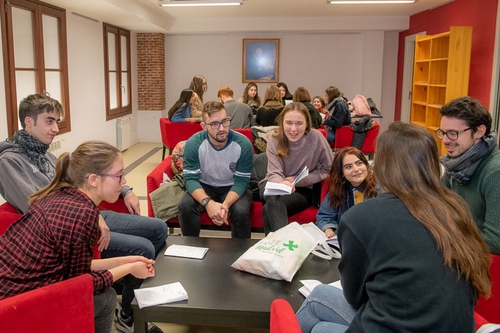Commented Bible Passages
September
If anyone is poor among your fellow Israelites in any of the towns of the land the Lord your God is giving you, do not be hardhearted or tightfisted toward them. Rather, be openhanded and freely lend them whatever they need. Be careful not to harbor this wicked thought: “The seventh year, the year for canceling debts, is near,” so that you do not show ill will toward the needy among your fellow Israelites and give them nothing. They may then appeal to the Lord against you, and you will be found guilty of sin. Give generously to them and do so without a grudging heart; then because of this the Lord your God will bless you in all your work and in everything you put your hand to. There will always be poor people in the land. Therefore I command you to be openhanded toward your fellow Israelites who are poor and needy in your land. (Deuteronomy 15:7-11)
In the life of ancient Israel, the relationship with God was lived out in relationships of solidarity among the members of the nation. The above passage from the Book of Deuteronomy illustrates well this link: people must be ready to “be openhanded and freely lend” to the poor, as to their own brothers or sisters.
The Law of Moses states that every seventh year, the fields must not be cultivated (Leviticus 25:4; see Exodus 23:10-11). This was for religious reasons, it was a “Sabbath of the ground,” to remind Israel that the true owner of the land was the Lord himself.
But this command, although religious in nature, also had an important social consequence. For the seventh year was also “the year for canceling debts” (Deuteronomy 15:1). As it approached, therefore, lenders tended to be reticent before the risk of a “resetting” that would penalize them. That is what the author calls a “wicked thought” (v. 9a). This thought could even become a true sin (v. 9b), because “whoever oppresses the poor shows contempt for their Maker” (Proverbs 14:31). Giving generously, on the other hand, would lead to God’s blessing (v. 10).
The last verse of our passage: “There will always be poor people in the land” (v. 11a) reminds us of the words of Jesus (see John 12:8). This somewhat pessimistic statement of the persistence of poverty leads to the energetic reminder of the commandment at the heart of the passage: “you will be openhanded towards your fellow citizens who are poor and needy in your land” (v. 11b). Seeing our fellows in need and opening our hands to them (see 1 John 3:17) in fact reflects God’s love towards humankind.
![]() Given the environment in which I live, what concrete response can I make to the call to “give joyfully” (2 Corinthians 9:7)?
Given the environment in which I live, what concrete response can I make to the call to “give joyfully” (2 Corinthians 9:7)?
![]() How can aiding my poor brother or sister be a source of fulfillment for me?
How can aiding my poor brother or sister be a source of fulfillment for me?
 TAIZÉ
TAIZÉ